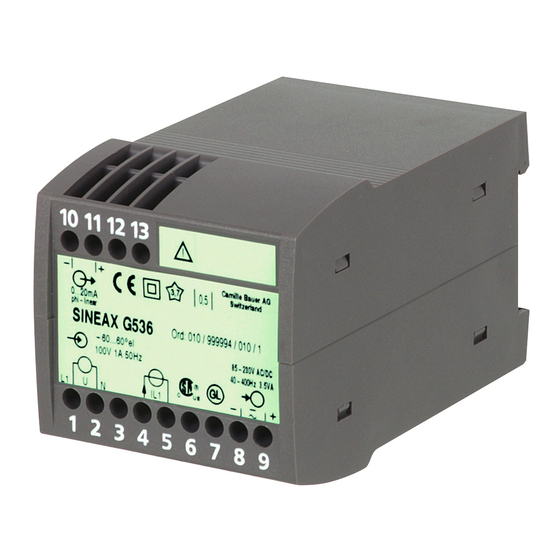Camille Bauer SINEAX G536 Operating Instructions Manual - Page 11
Browse online or download pdf Operating Instructions Manual for Transducer Camille Bauer SINEAX G536. Camille Bauer SINEAX G536 17 pages. Transducer for phase angle or power factor
Also for Camille Bauer SINEAX G536: Operating Instructions Manual (16 pages)

Operating Instructions
Transducer for phase angle or power factor SINEAX G536
Safety precautions to be strictly observed are marked with
following symbols in the Operating Instructions:
The instruments must only be disposed of in
the correct way!
Contents
1. Read fi rst and then .................................................... 11
2. Brief description ........................................................ 11
3. Technical data ........................................................... 11
4. Mounting ................................................................... 12
5. Electrical connections ............................................... 12
6. Commissioning and maintenance ............................. 14
7. Releasing the transducer .......................................... 14
8. Dimensional drawing ................................................. 14
9. Application notes ...................................................... 14
10. Instruments admissions ............................................ 14
1. Read fi rst and then ...
The proper and safe operation of the device
assumes that the Operating Instructions is
read carefully and the safety warnings given
in the various Sections
4. Mounting
5. Electrical connections
are observed.
The device should only be handled by appropriately trained
personnel who are familiar with it and authorised to work
in electrical installations.
Unauthorized repair or alteration of the unit invalidates
the warranty!
2. Brief description
The transducer SINEAX G536 measures the phase angle
or power factor between current and voltage of a single or
3 phase balanced network having a sine wave form.
The output signal, in the form of a load independent DC
current or voltage, is proportional to the phase angle ϕ resp.
power factor cosϕ between the 2 measured quantities current
and voltage.
3. Technical data
Measuring input
Measured quantity:
Phase angle or power factor
Measuring range:
Within – 180 - 0 - + 180 °el or
–1-ind-0-cap-1-ind-0-cap- –1
but clear indication only to
–170-0- +170 °el
measuring span ≥ 20 °el
Nominal frequency:
16 to 400 Hz (min. 40 Hz with power
supply from measuring input)
Nominal input
voltage:
10 to 690 V (min. 24 V, max.
230 V, acc. to build-in power pack,
with power supply from measuring
input)
Nominal input current: 0.5 to 6.0 A
Measuring output
DC current:
0 - 1 to 0 - 20 mA
1 - 5 to 4 - 20 mA
± 1 to ± 20 mA
Burden voltage:
– 12 V / 15 V
External resistance:
R
resp. ≤
I
AN
DC voltage:
0 - 1 to 0 - 10 V
0.2 - 1 to 2 - 10 V
± 1 to ± 10 V
Load capacity:
Max. 4 mA
Power supply
AC/DC power pack (DC or 50/60 Hz)
Rated voltage
85 - 230 V DC / AC
24 - 60 V DC / AC
Power consumption:
3 VA
Options
Connected to the low
tension terminal side:
24 V AC or 24 - 60 V DC,
see Fig. 4
Power supply from
measuring input
(self powered):
24 - 60 V AC or 85 - 230 V AC,
see Fig. 3
Please note the max. and min. measuring input
voltage!
Input voltage
Type label
range = internal
inscription
power supply
range
Self powered
by 1/2
24 - 60 V AC
(int. 24-60 V)
Self powered
by 1/2
85 - 230 V AC
(int. 85-230 V)
15 V
max. [kΩ] ≤
I
[mA]
ext
AN
– 12 V
– I
[mA]
AN
= Full output value
Tolerance
DC – 15 to + 33%
AC ± 15%
Power
Tolerance
supply
connection
Internal
± 15%
measuring
input
11
